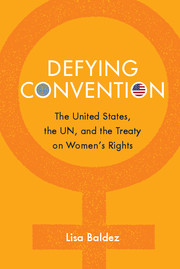Book contents
- Frontmatter
- Dedication
- Contents
- Acknowledgments
- 1 Introduction
- 2 A Scaffolding for Global Women’s Rights, 1945–1970
- 3 Geopolitics and Drafting the UN Treaty on Women’s Rights
- 4 An Evolving Global Norm of Women’s Rights
- 5 CEDAW Impact: Process, Not Policy
- 6 Why the United States Has Not Ratified CEDAW
- 7 CEDAW and Domestic Violence Law in the United States
- 8 Conclusion
- Works Cited
- Index
3 - Geopolitics and Drafting the UN Treaty on Women’s Rights
Published online by Cambridge University Press: 05 August 2014
- Frontmatter
- Dedication
- Contents
- Acknowledgments
- 1 Introduction
- 2 A Scaffolding for Global Women’s Rights, 1945–1970
- 3 Geopolitics and Drafting the UN Treaty on Women’s Rights
- 4 An Evolving Global Norm of Women’s Rights
- 5 CEDAW Impact: Process, Not Policy
- 6 Why the United States Has Not Ratified CEDAW
- 7 CEDAW and Domestic Violence Law in the United States
- 8 Conclusion
- Works Cited
- Index
Summary
Despite interference due to Cold War struggles between the superpowers, the CSW quietly passed a series of limited measures that laid the groundwork for future progress on women’s rights. Conflicts between the United States and the USSR limited the CSW’s ability to require UN members to take decisive action on women’s rights. As Chapter 2 illustrates, U.S. and Soviet delegates used the CSW to broadcast the superiority of their progress on women’s issues as well as their opposition to each other. Communist bloc countries wanted the CSW to adopt policies that required UN member states to take concrete action, whereas the United States and its allies envisioned the CSW as a source of general affirmations of support for women’s civil and political rights.
In the early 1970s, however, the UN abandoned its obstructionist stance. It suddenly changed course and took the lead on two major UN initiatives for women – the IWY conference and the drafting of CEDAW. Changes in the balance of power within the UN made this change possible. The emergence of the developing world as a majority-voting bloc within the UN led to the increasing marginalization of the United States and the USSR within the UN. The U.S. government under the Nixon, Ford, and Carter administrations looked to human rights, and women’s rights in particular, as a way to reassert declining U.S. power within the UN. These efforts did not immediately succeed in restoring American status within the UN; the United States would face humiliating diplomatic defeats at the World Conferences on Women in Mexico City in 1975 and Copenhagen in 1980. Nonetheless, U.S. support for these conferences proved crucial for getting CEDAW off the ground.
- Type
- Chapter
- Information
- Defying ConventionUS Resistance to the UN Treaty on Women's Rights, pp. 63 - 99Publisher: Cambridge University PressPrint publication year: 2014



